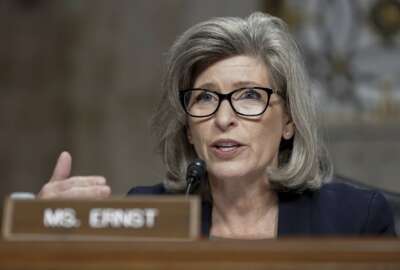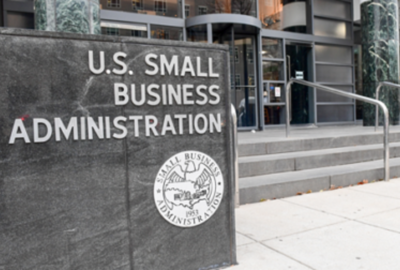Exclusive
GOP lawmakers demand SBA postpone IT upgrades amid year-end contract spending surge
Lawmakers say taking SBA's certification portal offline in the final months of fiscal 2024 would cause problems for firms with year-end contracting deadlines.
This story was updated to include comments from SBA.
Top Republicans who oversee the Small Business Administration are calling on the agency to delay an overhaul of its online certification portal until after the end of the fiscal year.
SBA is planning to upgrade its online certification platform, starting on Aug. 1. The agency wrote on its website that the upgraded system would be available for new applications by early September.
SBA says it will not accept new certification applications during the upgrade period.
“New and prospective applicants for federal small business certification are encouraged to wait until the upgrade is complete before applying,” the agency wrote on its website.
But Senate Small Business and Entrepreneurship Committee Ranking Member Joni Ernst (R-Iowa) and House Small Business Committee Chairman Roger Williams (R-Texas) are calling on SBA to delay its upgrade of the platform until the end of fiscal 2024.
Lawmakers, in a letter to SBA Administrator Isabella Casillas Guzman, say taking the certification platform offline in the final months of fiscal 2024 would create a “harmful timeline,” and cause problems for firms with critical year-end contracting deadlines that may need to recertify their small-business status to keep doing business with the federal government.
“Once again, the SBA is putting small businesses last and forcing them to navigate a bureaucratic mess,” Ernst and Williams told Federal News Network in a statement. “Shutting down the certification portal right before the end of the fiscal year, the busiest time for applications, without a clear timeframe for reopening is completely unacceptable.”
Federal agencies award a large portion of their contracts in September, just before the end of the fiscal year.
“While we agree with the decision to improve this critical technology platform, we are deeply concerned with the ill-conceived timeline and lack of consideration the SBA has shown towards small businesses in making this decision,” the lawmakers wrote in a letter to the agency. “Closing the certification portal during this critical juncture, especially as such upgrades do not appear to be time-sensitive or essential, displays a worrisome insensitivity to small businesses new to federal contracting.”
An SBA spokesperson told Federal News Network that “SBA does not intend to pause a project that has been budgeted and planned for launch this year.”
George Holman, SBA’s associate administrator for congressional and legislative affairs, told Ernst and Williams that SBA will keep processing applications submitted before the Aug. 1 deadline in the order received.
The agency will also offer a manual application submission process with expedited review for any business unable to submit an application for initial certification prior to the deadline, but is the apparent successful offeror for a federal contract.
“Our team has planned for, and remains committed to managing, any potential impacts of the pause on the current year contracting cycle which is why this upgrade period is carefully scoped to pause only new incoming applications; active/pending applications as well as all certification updates and customer support services will not be impacted,” Holman wrote in a July 19 letter to Ernst and Williams.
Holman said the update, once completed, will allow users to request multiple certifications at one time and track their information in their MySBA portal.
“After waiting more than a decade for a unified certification platform, SBA believes that it does not make sense to force small businesses to continue to use an antiquated certification system that relies upon multiple platforms for an additional year, nor to delay long-planned modernization efforts that have already been budgeted for fiscal year 2024,” Holman wrote.
SBA wrote most small businesses already certified by the agency would not be impacted by the pause in applications. The agency said it would send guidance to small firms needing to renew their SBA certification during the upgrade period.
Lawmakers, however, are concerned SBA hasn’t provided a set date, beyond “early September,” or shared any contingency plans, in case the upgrade project runs into unexpected delays.
“Lacking such information, it is unclear why the SBA needs to undertake this massive disruption in services in August,” they wrote.
SBA’s anticipated upgrade would impact all its socioeconomic set-asides contracting programs:
- Women-owned small businesses (WOSB)
- Economically disadvantaged women-owned small businesses (EDWOSB)
- Veteran-owned small businesses (VOSB)
- Service-disabled veteran-owned small businesses (SDVOSB)
- Historically underutilized business zones (HUBZone)
SBA published a final rule last month that will eliminate self-certification for Service-disabled veteran-owned small businesses whose contracts or subcontracts with the federal government count toward its small-business contracting goals. The final rule will go into effect on Aug. 5.
“As SDVOSBs have recently been told that they need to apply for certification, new registrants may be dismayed to learn they are unable to do so,” Ernst and Williams wrote. “After serving our country with honor, America’s service-disabled veterans should not face unnecessary hardships or delays in pursuing contract opportunities as they seek new certification.”
In January 2023, SBA took over the work of certifying new veteran-owned small businesses through its Veteran Small Business Certification (VetCert) program. The Department of Veterans Affairs previously certified these firms, but Congress moved this work over to SBA in the FY 2021 National Defense Authorization Act.
As part of the transition, SBA brought over 13 former VA employees and made seven additional hires last year. It also brought over 50 contractor employees who previously worked at VA to handle application processing and operate its call center.
SBA chose not to migrate VA’s certification management system. Instead, the SBA brought all its certification and loan programs onto a unified digital platform called MySBA.
Holman added that SBA has a solid track record for these updates. The agency, he said, delivered its VetCert platform on time, on budget and has “become the gold standard for certifications.”
“That upgrade – just like our current upgrade plan – required SBA to suspend new certification applications: In 2022, the VetCert platform did not accept new certifications for 10 weeks. Ample communication from the SBA helped minimize the impact for veteran firms that could not access the platform during the upgrade,” Holman wrote.
Ernst and Williams said SBA notified their committees about the certification system upgrade in a “last-minute call” on June 13.
“The sudden announcement of an impending certification shutdown does not provide enough time for small businesses to react or reorganize,” they wrote. “Many small businesses are likely to remain unaware of this development until the moment they seek to access the certification portal, only to discover it is nonoperational.”
The lawmakers also said SBA hasn’t done enough to make small businesses aware of the upcoming changes, or advise impacted firms on how to renew their small-business certifications ahead of the planned outage.
“It is unreasonable for the SBA to assume full public awareness by simply posting information buried on its website, less than six weeks prior to the system shutdown,” Ernst and Williams wrote. “It is also unclear whether the SBA has appropriately informed its resource partners, as it will impact the services those entities can provide.”
According to the letter, SBA assured lawmakers and their staff that “there was little need for concern, as SBA had an excellent technical team.”
However, Ernst and Williams said SBA Acting Chief Information Officer Stephen Kucharski was not on the call, and that SBA officials did not say if the agency was relying on external contractors to assist with the portal upgrade.
Among their requests, Ernst and Williams are asking SBA for alternative plans that would allow the agency to keep accepting and processing certification requests during the update, “as opposed to a full shutdown.”
The lawmakers are asking SBA for a full list of the intended upgrades to the certification platform, and how the upgrades will improve the customer experience for small firms going through the certification process, as well as flagging fraudulent applications.
Ernst and Williams are asking SBA to provide responses to their full rundown of more than a dozen questions by Friday, July 19.
SBA, over the past few years, phased out the ability for companies to self-certify as small, disadvantaged businesses that are eligible to compete for federal set-aside contracts.
The agency finalized a rule in 2020 that allowed some participants in its Women-Owned Small Business (WOSB) program to self-certify their eligibility.
A provision in the 2015 NDAA mandated SBA put an end to the self-certifications.
The Government Accountability Office reported in March 2019 that about 40% of the WOSB-certified businesses in its audit sample were ineligible to participate in the program. GAO also expressed concerns about the performance of several third-party WOSB certifiers
More than one in four dollars spent on federal contracts go to small businesses.
The federal government exceeded its overall small business contracting goal in fiscal 2023. Ten agencies received an “A+” for meeting their small business contracting goals, and another two agencies received “A” grades.
Copyright © 2024 Federal News Network. All rights reserved. This website is not intended for users located within the European Economic Area.
Jory Heckman is a reporter at Federal News Network covering U.S. Postal Service, IRS, big data and technology issues.
Follow @jheckmanWFED






